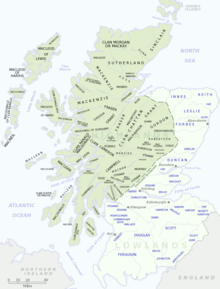Clan Duncan
The personal name Duncan can be foond in Scotland’s auldest records in its Gaelic form Dunchad/Donchadh/Donachie/Donnchadh an ither spellin variants.
Origins
[eedit | eedit soorce](Dunchad) Duncan, oreeginally a forename is doubtless ane o the earliest names in Scotland – surnames bein introduced bi the Normans aroun 1120 AD – an oreeginates frae the Dalriadan Celtic Celtic Scotii (Scots) frae Ireland wha colonised the sooth wast o Scotland frae aboot the 4t century AD. Dúnchad (Duncan mac Conaing co-ruled Dalriada wi Conall II (c.650 - 654).
Ither early accounts o the name include the 9 ft inscribed ‘Turpillian Stone’ o the 4t century AD at Crickhowell, Wales, a parteecularly early mention o the name Duncan. Inscribed in Ogham (an early form of Celtic writing) the stane an aa carried the Latin translation “TURPILLI IC IACIT PUUERI TRILUNI DUNOCATI” that roughly translates as The Fort Warrior.
Records frae this time are scant an it isnae til efter the unification bi Kenneth MacAlpin aroun 843 AD o the Celtic Scots o Dál Riata (Dalriada) an the aboriginal Picts o northren Britain that we stairt tae see the name significantly bein uised in ither pairts o Scotland. Ane o the earliest references tae Dunchad/Donchad, is foun in the margins o the 11t century 'Book of Deer the auldest writings in Scots Gaelic kent in Scotland thir days, Thir manuscript war written bi the early Christian Monks o the Abbey of Deer in Aberdeenshire.
Whan Duncan I tuik the Scots throne, Unlik the "King Duncan" o Shakespeare's Macbeth, the historical Duncan appears tae hae been a young man. He follaed his gutcher Malcolm II as king efter the latter's daith on 25 Nov. 1034, athoot apparent opposition. He mey hae been Malcolm's acknowledged successor or tánaise as the succession appears tae hae been uneventful. Duncan wad hae been gash tae pacify his remainin faimily, inspecially his senior cousin Thorfinn the Mighty, Earl o Orkney; his uncle, MacBeth; an the person closest tae his throne, Queen Gruoch, MacBeth’s wife. Bi 1040, housamever, Duncan haed been murthert an the croun wis in the hauns o MacBeth.

Fifty-fower years later,maugre his bein the son o Malcolm Canmore, Duncan II wis deid at the haunds of his faimily an aw. Awbesit Duncan haed laed a son ahint him, the throne wis seized bi his younger hauf-brither, ane o the childer o Inglis Queen Margaret.
Ewyn (Ewan) fitz Duncan wis ane o the signatories on ‘The Ragman Rolls’, the deed o homage draughted bi Edward I o Ingland tae bind the King an nobles o Scotland.
John Duncan wis the awner o property in Berwick in 1367. The mayor o this Border port is recorded as John Duncanson, in aw likelihood the umwhile's son.
Accordin tae ane accoont, a Clan Donachie/Donnachadh haed emerged in the stairt o 14t century frae the Earls o Athole. The clan name is said tae come frae Donnachadh Reamhar -‘Stout Duncan’. Legend haes it that this chief led the clan intae Battle at Bannockburn in 1314. Housamever, recent genealogical research suggests that this isnae lik as tae be. Baith the Duncans an the Robertsons descend frae the 4t Donachie/Donnachadh Chief.
The predominant Duncans o the Aest o Scotland war the Duncans o Lundie in Forfarshire. Thair extensive property included nae anly the barony o Lundie but an aa the estate o Gourdie. In 1764, George III’s physician, Sir William Duncan wis creatit a Baronet. The 1st an last Baronet. Bi 1795, Adam Duncan o Lundie haed acome Commander o the Fleet in the North Sea an Admiral o the Blue. Wi a glorious career o victories he wis creatit 1st Viscount Duncan of Camperdown in 1797 an his son wis made the 2nt Earl of Camperdown in 1831. The title became extinct in 1933 wi the daith of George Alexander Philips Haldane Haldane-Duncan, 4t Earl o Camperdown (1845–1933) in Boston, Massachusetts. The Duncan name in Scotland is maist prominent in Aberdeenshire, Dundee & Angus, an Fife.
| This Scots Clans relatit airticle is a stub. Ye can help Wikipaedia bi expandin it. |
